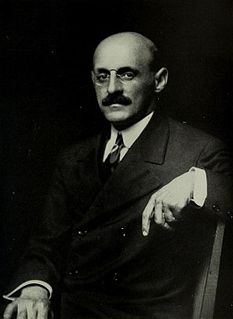A Quote by Laurence Sterne
Madness is consistent; which is more than can be said for poor reason. Whatever may be the ruling passion at the time continues equally so throughout the whole delirium, though it should last for life. Madmen are always constant in love; which no man in his senses ever was. Our passions and principles are steady in frenzy; but begin to shift and waver, as we return to reason.
Related Quotes
Curiosity, which may or may not eventuate in something useful, is probably the most outstanding characteristic of modern thinking ... Institutions of learning should be devoted to the cultivation of curiosity, and the less they are deflected by the consideration of immediacy of application, the more likely they are to contribute not only to human welfare, but to the equally important satisfaction of intellectual interest, which may indeed be said to have become the ruling passion of intellectual life in modern times.
As long as the reason of man continues fallible, and he is at liberty to exercise it, different opinions will be formed. As long as the connection subsists between his reason and his self-love, his opinions and passions will have a reciprocal influence on each other, and the former will be objects to which the latter attach themselves.
We are not to renounce our senses and experience, nor (that which is the undoubted Word of God) our natural Reason. For they are the talents which he hath put into our hands to negotiate, till the coming again of our blessed savior, and therefore not to be folded up in the napkin of an implicate faith, but employed in the purchase of justice, peace, and true religion. For though there be many things in God's Word above Reason--that is to say, which cannot by natural reason be either demonstrated or confuted--yet there is nothing contrary to it.
Aestheticism and radicalism must lead us to jettison reason, and to replace it by a desperate hope for political miracles. This irrational attitude which springs from intoxication with dreams of a beautiful world is what I call Romanticism. It may seek its heavenly city in the past or in the future; it may preach 'back to nature' or 'forward to a world of love and beauty'; but its appeal is always to our emotions rather than to reason. Even with the best intentions of making heaven on earth it only succeeds in making it a hell - that hell which man alone prepares for his fellow-men.
But avarice and ambition in the rich, in the poor the hatred of labour and the love of present ease and enjoyment, are the passions which prompt to invade property, passions much more steady in their operation, and much more universal in their influence. Wherever there is great property there is great inequality. For one very rich man there must be at least five hundred poor, and the affluence of the few supposes the indigence of the many.
Science and art may invent splendid modes of illuminating the apartments of the opulent; but these are all poor and worthless compared with the common light which the sun sends into all our windows, which he pours freely, impartially over hill and valley, which kindles daily the eastern and western sky; and so the common lights of reason, and conscience, and love, are of more worth and dignity than the rare endowments which give celebrity to a few.
In all things, therefore, where we have clear evidence from our ideas, and those principles of knowledge I have above mentioned, reason is the proper judge; and revelation, though it may, in consenting with it, confirm its dictates, yet cannot in such cases invalidate its decrees: nor can we be obliged, where we have the clear and evident sentience of reason, to quit it for the contrary opinion, under a pretence that it is matter of faith: which can have no authority against the plain and clear dictates of reason.
It may indeed prove to be far the most difficult and not the least important task for human reason rationally to comprehend its own limitations. It is essential for the growth of reason that as individuals we should bow to forces and obey principles which we cannot hope fully to understand, yet on which the advance and even the preservation of civilization depend.
We cannot begin with complete doubt. We must begin with all the prejudices which we actually have when we enter upon the study ofphilosophy. These prejudices are not to be dispelled by a maxim, for they are things which it does not occur to us can be questioned. A person may, it is true, in the course of his studies, find reason to doubt what he began by believing; but in that case he doubts because he has a positive reason for it, and not on account of the Cartesian maxim. Let us not pretend to doubt in philosophy what we do not doubt in our hearts.
You see, gentlemen, reason is an excellent thing, there’s no disputing that, but reason is nothing but reason and satisfies only the rational side of man’s nature, while will is a manifestation of the whole life, that is, of the whole human life including reason and all the impulses. And although our life, in this manifestation of it, is often worthless, yet it is life and not simply extracting square roots.






































